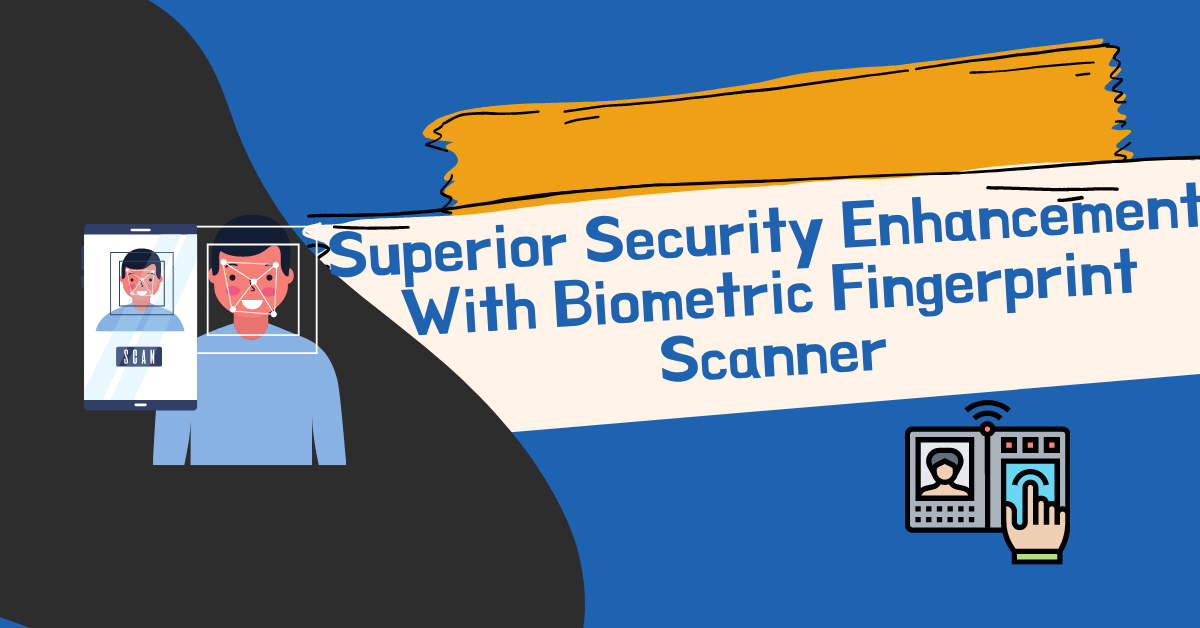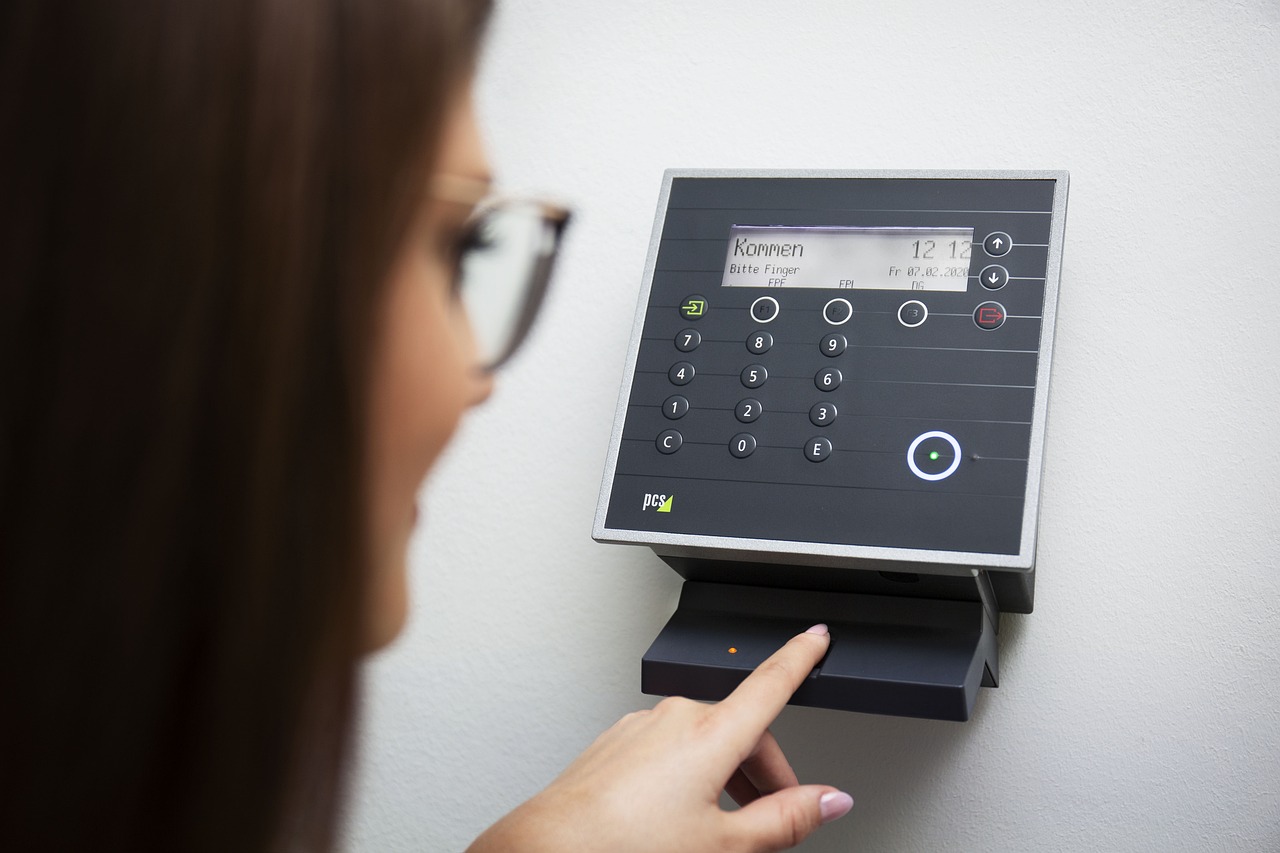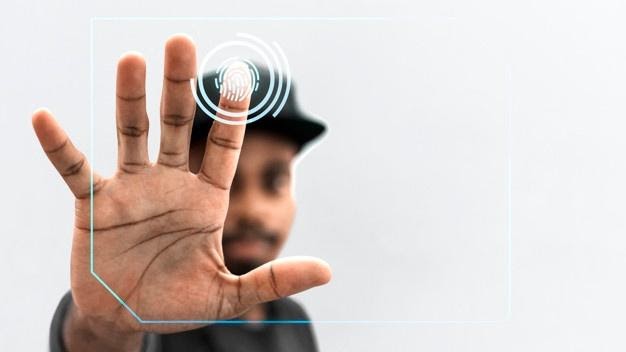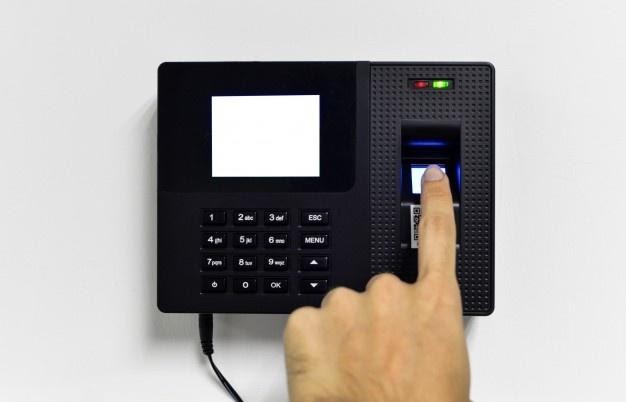Here, we will talk about security enhancement with a biometric fingerprint scanner.
Look around you and notice that fingerprint recognition is one of the most widely utilized biometrics recognition systems.
Laptops, smartphones, and tablets are all equipped with a fingerprint recognition system that works seamlessly. It has been a long time since record book signing, ID cards, and security guards checking on entry and exits of commercial spaces have taken backfoot.
Not only are these technologies time-consuming, wasteful, and unreliable, but they also create a significant security gap in workplaces and security checkpoints.
Today, security systems in commercial places, as well as residential places, are much tighter and more reliable thanks to modern technologies such as biometric fingerprint scanners. This is a time-saving and efficient security system that may offer you well-regulated and controlled entry to guests and personnel to any location.
There is no need to remember hard passwords and no need to change passwords from time to time. Touch with your fingers and your access is processed.
READ ALSO: How Far Have Facial Recognition Searches Come?
Table of Contents
Superior Security Enhancement With Biometric Fingerprint Scanner
In today’s digital world, safeguarding our data and personal information is paramount. Traditional passwords and PINs are becoming increasingly vulnerable to hacking and brute-force attacks.
Biometric fingerprint scanners offer a powerful and convenient solution, providing superior security enhancement for a wide range of applications.
Unveiling the Advantages of Fingerprint Scanners
- Unequivocal Identification: Fingerprints are unique to every individual, offering an unmatched level of security compared to passwords or tokens that can be stolen or shared.
- Enhanced Convenience: Fingerprint scanners eliminate the need to remember complex passwords or carry additional keys. A simple touch provides instant, secure access.
- Speed and Efficiency: Fingerprint recognition is significantly faster than traditional authentication methods, streamlining access control processes.
- Reduced Risk of Errors: Fingerprint scanners eliminate the possibility of typos or forgotten passwords, improving overall system usability.
- Multi-Factor Authentication Integration: Fingerprint scanners can be seamlessly integrated with multi-factor authentication protocols, adding an extra layer of security.
Applications for Superior Security
- Securing Devices: Fingerprint scanners are widely used to secure smartphones, laptops, and tablets, protecting sensitive data and personal information.
- Access Control Systems: Fingerprint scanners control access to buildings, restricted areas, and physical security systems, ensuring authorized entry.
- Financial Transactions: Fingerprint verification is increasingly used for online banking, mobile payments, and other financial transactions, safeguarding sensitive financial data.
- Data Encryption: Fingerprint scanners can be used to encrypt sensitive data on computers and storage devices, adding an extra layer of protection.
- Border Security: Fingerprint scanners play a vital role in border security, verifying the identity of travelers and streamlining immigration processes.
Future Advancements in Fingerprint Technology
- Enhanced Liveness Detection: Emerging technologies can differentiate between real fingers and spoofs, further bolstering security.
- Integration with Wearables: Fingerprint scanners embedded in wearables like smartwatches could offer even more seamless and convenient security solutions.
- Multi-Spectral Imaging: Advanced scanners utilizing multi-spectral imaging capture additional data points for even more robust fingerprint recognition.
The Future is Secure with Fingerprint Scanners
Fingerprint scanners are rapidly evolving, offering a powerful and convenient security solution for individuals, businesses, and governments alike.
As technology advances, fingerprint scanners will continue to play an increasingly vital role in safeguarding our data and physical security in the digital age.
READ ALSO: The Role of AI in Powering Biometric Palm Scanner Accuracy & Security
Why You Should Use Biometric Fingerprint Scanner?
Biometric fingerprints function by scanning the complex and unique whorls, shapes, and ridges of human fingers. It cannot be argued that a fingerprint scan cannot be duplicated, but when you think about it, it’s quite tough for typical criminals to get past such a system.
- Biometric Fingerprint scanners are fast and recognize fingerprints with a single touch.
- This can be used parallelly with voice recognition systems and face recognition devices to intensify security management.
- It eliminates the need to memorize puzzling passwords, and there is no need for email verification, OTP, etc.
- Easy to use and ensures fast and reliable verification and identification of persons.
- However, while registering for a biometrics fingerprint scanner, if you register with a single finger, you need to remember that while scanning later, or else you can register with more than one finger.
Besides, there are a lot more advantages of integrating biometric fingerprint scanners for identification verification in banks, offices, residential apartments, institutes, etc.
Simplified Use
You know for sure how irritating and difficult things can be when you forget passwords. This happens with everyone at some point, whether it is your email, ATM card, banking password, passwords are sometimes tough to remember, and you tend to puzzle or forget them.
When your security or verification check includes fingerprint scanning, however, there is probably no room for forgetting or mistyping.
Tight Security
You may forget passwords, but the fingerprint of a human is something that does not change. It is a unique identification for every human being, as no two humans can have the same fingerprints. This and the fact that fingerprint scanning cannot be shared like passwords minimizes the scope of trespassing and fraud.
Buddy punching can be avoided when you install a biometric fingerprint scanner in your institution. It saves time and increases the efficiency of the work system.
Reliability
When there is a biometric fingerprint scanner system that ensures an identity or person with unique biometrics, it enhances the reliability of the whole system.
Highly secured laboratories, workspaces, institutes, staff zones, etc., need to allow entry only to specific people related to that work or department.
Besides, even in banks and financial institutes, your identity is the most valuable security for your property and account, and with a biometric fingerprint scanner, this security can be sustained.
Superior Security Enhancement with Biometric Fingerprint Scanners: FAQs
Fingerprint scanners are a popular form of biometric technology, offering a unique and convenient way to enhance security. Here are some FAQs to address common questions about fingerprint scanners and biometrics in general:
How has the use of biometric sensors enhanced our security?
Biometric sensors, like fingerprint scanners, offer several advantages over traditional security methods:
- Uniqueness: Biometric identifiers like fingerprints are unique to each individual, making them more difficult to forge compared to passwords or PINs.
- Convenience: Biometric authentication is faster and more convenient than remembering complex passwords or carrying keys.
- Reduced Errors: Fingerprint scanners eliminate the possibility of typos or forgotten passwords, improving overall system usability.
- Multi-Factor Integration: Biometrics can be combined with other security measures like passwords or tokens for multi-factor authentication, providing even stronger security.
Which biometrics has the highest security?
The “most secure” biometric depends on the specific application and technology used. However, some general points to consider:
- Fingerprint scanners offer a good balance between security, convenience, and cost-effectiveness.
- Iris recognition is often considered highly secure due to the unique patterns in the iris.
- Facial recognition technology is rapidly advancing but can be susceptible to variations in lighting or facial expressions.
How do biometric fingerprint scanners work?
Fingerprint scanners use a sensor to capture a digital image of your fingerprint. This image is then converted into a mathematical representation (a template) and stored securely on the device. During authentication, a new scan of your fingerprint is compared to the stored template. If they match, access is granted.
What are biometrics for visas?
Biometric data, including fingerprints and facial scans, can be used in visa applications to verify a person’s identity and help prevent fraud. This can streamline the visa application process and enhance border security.
What is biometric authentication and how does it enhance security?
Biometric authentication is a security method that relies on unique biological characteristics to verify a person’s identity. Fingerprint scanners are a common example. Biometric authentication provides a stronger layer of security compared to traditional methods because it’s much more difficult to forge a fingerprint than to steal a password.
What is the difference between biometric and fingerprint?
Biometrics is a broad term that refers to any technology that uses biological characteristics (like fingerprints, iris scans, or facial recognition) for identification or authentication. Fingerprint scanners are a specific type of biometric technology that focuses on using fingerprints for these purposes.
Conclusion
Therefore, this is perhaps a smart one-time investment to secure not only your work management process but even the security quotient.
In this age when passwords are taking backside with innovative biometric approaches, it is indeed smart to move with time and adopt biometric fingerprint scanners and let go of the old password, number lock, etc., security check systems.
- 16+ Best Free Online Virus Scanners And Removers For 2021
- Hackers Target WhatsApp with Verification Scam
- Samsung admits Strange Thumbprints can unlock Galaxy S10
- 10 Best Antivirus for a Basic Laptop [Must Read]
- NetBeans projects are being poisoned by malware – GitHub warns Java Developers
- How to migrate from Windows 7 to Windows 10
- How To Recognize And Avoid A Fake Virus And Malware Warning
About the Author:
Chandra Palan is an Indian-born content writer, currently based in Australia with her husband and two kids. She is a passionate writer and has been writing for the past decade, covering topics ranging from technology, cybersecurity, data privacy and more. She currently works as a content writer for SecureBlitz.com, covering the latest cyber threats and trends. With her in-depth knowledge of the industry, she strives to deliver accurate and helpful advice to her readers.










